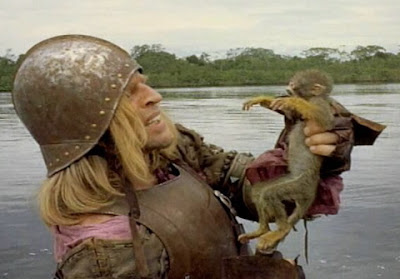Aguirre, Wrath of God
 There's a mystery at the heart of Werner Herzog's Aguirre, Wrath of God, though as far as I'm aware it's elicited little if any comment. The story recounts the titular Lope de Aguirre's revolt on a Spanish expedition sent by Gonzalo Pizarro from Peru towards the Amazon in search of El Dorado. Pizarro puts nobleman Don Pedro de Ursúa in charge, but it is when he proposes giving up on the enterprise that Aguirre revolts, taking Ursúa prisoner and installing a puppet leader, gluttonous Fernando de Guzmán, as Emperor of the lands still to be conquered. The mystery, however, concerns Ursúa. From the moment of the mutiny onwards, during the long days and weeks, perhaps even months, in which he is kept captive until he is eventually executed following Guzmán's own demise, the deposed chief refuses to say a single word either in his own defense or in accusation against Aguirre's treachery. Moreover, he clings tightly to something in his fist, which the force of three men is unable to open. So what, then, is Ursúa holding?
There's a mystery at the heart of Werner Herzog's Aguirre, Wrath of God, though as far as I'm aware it's elicited little if any comment. The story recounts the titular Lope de Aguirre's revolt on a Spanish expedition sent by Gonzalo Pizarro from Peru towards the Amazon in search of El Dorado. Pizarro puts nobleman Don Pedro de Ursúa in charge, but it is when he proposes giving up on the enterprise that Aguirre revolts, taking Ursúa prisoner and installing a puppet leader, gluttonous Fernando de Guzmán, as Emperor of the lands still to be conquered. The mystery, however, concerns Ursúa. From the moment of the mutiny onwards, during the long days and weeks, perhaps even months, in which he is kept captive until he is eventually executed following Guzmán's own demise, the deposed chief refuses to say a single word either in his own defense or in accusation against Aguirre's treachery. Moreover, he clings tightly to something in his fist, which the force of three men is unable to open. So what, then, is Ursúa holding?This is a film all about silence and the unknown. There are many long scenes with scarcely a word of dialogue, such as the famous opening shots of Pizarro's men descending a precipitous Andean slope along with their hundreds of Indian slaves and all the cumbersome machinery of early modern battle: cannons, horses, heavy body armor. And silence inevitably presages danger. As one character comments of another, he "panicked because of the silence which always comes just before someone gets killed." So there are various points at which Aguirre furiously insists upon noise, of any kind: whether it be volleys of cannon fire or indigenous pipe music. And so Ursúa's silence is hardly neutral. It's a brooding judgement on the mutiny's future, on the way in which Aguirre's limitless ambition is ensuring that the entire party is drifting ever more surely to their deaths.
Meanwhile, the unknown lies all around. The Spaniards have less and less idea of the location of the famed indigenous city of gold, and indeed increasingly they are merely drifting ever more aimlessly. They sense the presence of invisible enemies, hostile Indians hidden by the foliage on the river banks, from which occasionally deadly arrows or darts strike down the helpless adventurers. More to the point, as time passes and they descend into some kind of collective madness in which their ever-present fantasies finally overcome their senses, they become uncertain about what is illusion and what is real. They pass a boat stranded high in a tree and no longer trust their eyes. "That ship is in your imagination. No floodwaters could rise this high. We all have the fever." Shortly afterwards, the character to whom this reassurance is addressed mutters to himself "That is no ship. That is no forest. That is no arrow. We just imagine the arrows because we fear them." But then Aguirre, who is at once the most deluded and the most grounded of them all, shouts out "These arrows are real, take cover!" Not everything in their delusion is error.
So what, if anything, is Ursúa clutching so insistently? The men assume "he must have something in it," but neither they nor we ever fathom the secret. It's as though the hard kernel of an unknowable real lies at the centre of the enterprise, as well as on its borders and banks. It is not just the subaltern who is mute and inscrutable, but also the site of (now deposed) power itself. Aguirre and his fellow renegades chart a perilous course through the imagination, between these two Reals: the Real of imperial power and the Real of the native other. They construct a parodic version of Empire that also takes the imperial project beyond its own bounds, taking its deterritorializing impulses at its word. But in the end power is never about the word, never about the language of command. Is this perhaps their big mistake, to have taken over-literally the stories fed to them; to have taken the discourse of hegemony at face value rather than to have attended to the silence around which Ursúa's fist is folded.

YouTube Link: the fantastic final scene.
